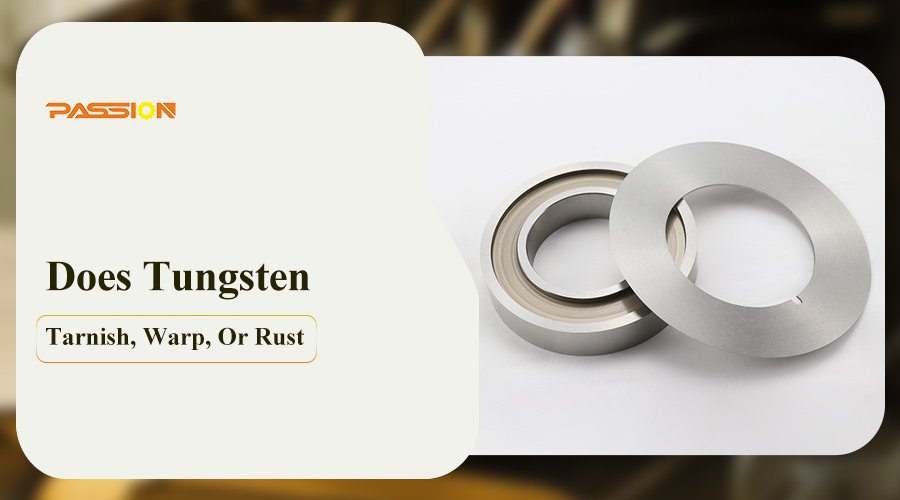Tungsten is known for being really hard and tough, but a lot of people who are thinking about buying industrial materials want to know if it’s going to tarnish, warp, or rust. That’s a big deal if you’re a purchasing guy or a buyer of tungsten-based products, especially if you’re picking materials for heavy-duty industrial applications. You want to make sure that the tungsten products you buy are going to last a long time and work the way you need them to, so you don’t have to replace them and you can keep your operation running right.
High-quality tungsten doesn’t tarnish, warp, or rust under normal conditions. However, lower-quality tungsten alloys, especially ones mixed with cobalt, can oxidize or corrode in certain environments.
In this article, we’ll talk about what tungsten is like and how it resists tarnishing, warping, and rusting, and what that means for industrial applications like blades and cutting tools.
What Is Tungsten and Why Is It Important For Industrial Use?
Tungsten is one of the hardest metals known to man, ranking 9 out of 10 on the Mohs hardness scale. Its high melting point, strength, and resistance to corrosion make it a popular choice for a wide range of industries, including manufacturing, aerospace, and tool-making. When combined with carbon to form tungsten carbide, it becomes even tougher, making it perfect for industrial blades used in cutting, slitting, and shaping.
For businesses, which makes high-quality industrial knives and blades, tungsten is a must-have. Its resistance to wear and tear means that blades made with tungsten can last a long time, even when they’re under a lot of pressure and being used a lot.
Does Tungsten Rust In Water?
Tungsten, in its pure form, doesn’t rust. It’s highly resistant to corrosion, even when it’s exposed to water or moisture. It’s stable and doesn’t oxidize, unlike other metals like iron or steel. That’s why people use tungsten when they need something that’s going to last and not be affected by the environment.
But not all tungsten products are made from pure tungsten. Some tungsten alloys, especially ones that have cobalt as a binder, can rust if they get wet. That’s especially true if the water they’re exposed to has other stuff in it that can corrode things, like saltwater. If you’re buying industrial products, you need to know what kind of tungsten is in them so you don’t get rust and you can keep your stuff working.
Can Tungsten Warp Over Time?
Tungsten’s hardness also makes it resistant to warping. Softer metals can bend or warp under stress or high temperatures, but tungsten stays intact even under extreme conditions. This is important for industries that rely on precision cutting tools because any warping can make them less efficient and not work as well. For example, in the production of slitting blades used in manufacturing, if they warp, the cuts won’t be accurate, and the company will waste materials. Tungsten keeps its shape, so the cuts are always right, which is why it’s the best material for high-performance industrial tools.
How To Maintain Tungsten Industrial Blades?
Even though tungsten is tough and hard to damage, you still need to take care of it to make sure your tungsten blades keep working great. Here are some tips to help you take care of your tungsten-based industrial blades:
Clean them: Tungsten doesn’t rust, but you still want to keep your blades clean and dry so that stuff doesn’t get on them and mess them up.
Don’t use cobalt alloys in wet environments: If you’re working in a place with a lot of humidity or water, make sure your tungsten blades are made from pure tungsten or tungsten carbide without cobalt because cobalt can rust.
Check them for wear and tear: Even though tungsten is tough, you still want to check your blades to see if they’re wearing out or if anything is wrong with them.
Sharpen them: Tungsten blades stay sharp longer than other materials, but you still want to sharpen them so they keep cutting great.
If you follow these tips, you can make your tungsten blades last longer and work better, even in tough environments.
Does Tungsten Scratch?
Tungsten is really hard to scratch, which is why people use it for industrial stuff and jewelry. On the Mohs hardness scale, tungsten is just below diamond, which means it can take a lot of rubbing without showing any wear.
In industrial settings, this means that blades made out of tungsten last a long time and stay sharp for a long time. If you’re buying slitting or cutting blades, this is a big deal. It means you don’t have to replace them as often, you don’t have as much downtime, and you get the same product out the door every time. But tungsten can still get scratched by stuff that’s harder than it, like diamonds, so you have to be careful if you’re using these blades around that kind of stuff.
Tungsten is a material that is super strong, lasts a long time, and doesn’t wear out. It doesn’t tarnish, bend, or rust under normal industrial conditions, which makes it great for people who want tools that last a long time and work great. But not all tungsten is the same. You have to be careful with tungsten alloys that have cobalt in them because they can rust if they get wet or are in a humid environment.
For companies, selling tungsten blades that are really good means that their customers get blades that work great and last a long time. If you take care of them, tungsten blades can last for years and always cut great without the risk of rusting or bending.



